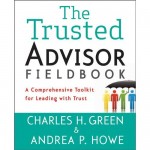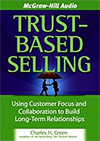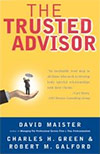This article was first published in Raintoday.com
Suppose you’re bidding on some work, and the client says, “I might as well tell you, you have two competitors on this job: Widget Associates, and Smithtown Group.”
Do you then:
- Say nothing.
- Seize the opportunity to make a differentiating statement about your own firm.
- Hold your fire, and discretely refine your approach later in the process.
- Say, “That’s interesting – care to share why you chose the three of us?”
Of the above choices, I’d go with “d” and try to start a conversation.
However, there is a better choice – “e” – but before we see what “e” is, a little explanation.

Thinking About Your Competitors
To talk right, you must think right. And when it comes to talking about competitors with prospects, we usually don’t think right. Why? Our primary, ultimate and overriding objective is usually to win the sale. The result: our blatant display of disregard for the prospect’s interests is likely to lose us the sale.
I once heard a physician say, “In my 20 years of being a doctor, I never once heard a pharmaceutical rep from any company recommend a drug from any company but their own. So I don’t trust any of them.”
If you never concede the possibility that someone other than yourself might actually be better-suited than you for a given situation, then your objective is showing: you’re not in it for anyone but yourself.
You can’t avoid the appearance of self-absorption by using magic “lines” either. They may work if you’re selling free throws for a quarter at a county fair, but the more complicated a service or solution is, the more sophisticated the buyer is about choosing a service provider. Being sly, or clever won’t help you out.
What’s to be done? I don’t suggest you recommend the others, or even compliment them. No one faults you for a healthy competitive desire to win – the only issue here is what principles you would be willing to sacrifice in your pursuit of that goal.
So the right thing to say begins with the right thing to think. And the right thing to think is – what will be the best solution for the prospective client?
The Best Solution For The Client
If you’ve ever had the good fortune to debrief a prospect’s decision process post-purchase, you know that things look much clearer in the rear-view mirror. Whether you won or lost, it becomes obvious that the client really wanted the fast-payback solution, or the integrated solution, or the global solution, or whatever.
Whichever firm blunted its sword by attempting to argue the opposite was not only swimming upstream, but digging a hole for itself by appearing not to listen. If you won and that stubborn firm was your competitor, you probably nod your head knowingly: “Tsk tsk, how could they have missed those clear signals?”
But if it was your firm that lost – then you know how painful it is to think, “How, how could we have been so blind? And we thought we were doing the right thing?”
The simple truth about whether you won or lost is either your firm is probably better than your competitors at the fast payback solution or they are better than you. Ditto for the integrated solution. Or the global solution. Face it. Deal with it. It’s the truth.
Now, the implications. If you’re at a disadvantage for the fast payback solution – why would you want to pretend otherwise? In the unlikely event you are able to confuse and mislead the prospect, you win under false pretenses, and will have a very unhappy client when they learn the truth.
And if you’re at a disadvantage anyway, why would you want to argue against what the prospect probably perceives as truth, and be perceived as dishonest?
So, there is no benefit in saying things that make you sound better than you are. You might ask – is there an advantage in saying things that make you sound worse than you are? No – that is equally bad, because both make you untrustworthy in the eyes of the prospect. And if your objective is to find the best solution for the prospect, you need to be trusted when you do so.
So far this may sound like an argument for suicide. If we’re disadvantaged, are we supposed to just recommend the other guy and roll over? Absolutely not – because there is one factor we haven’t discussed. And that is the power of truth-telling in the pursuit of client service.
Tell The Truth
Suppose you were to just give up the struggle for winning, and accept that the objective of finding the best solution for the prospective client means just that – your job is to find the best solution for the prospective client.
Occasionally, that means blatantly redirecting the company that is interested in your services. I have seen lawyers say, “you don’t need a divorce attorney, you need a therapist – I’ll recommend one to you.” I have seen consultants say, “I think you need a firm that does more change management than we do.” Such clear client-orientation impresses prospects – and they have long memories, and big networks.
But more frequently, a commitment to finding the best solution means focusing on defining the characteristics of the best solution – and not focusing on the particular merits of a given solution.
The Test
Let’s come full circle and ask the question at the beginning of this article again. When the client says, “I might as well tell you, you have two competitors on this job: Widget Associates and Smithtown Group,” you respond with:
You: “That’s interesting – care to share with me why you chose those three?”
Client: “Well, you’re all reputable; all made the short list; we figure each of you can bring something to bear. Anything you care to share with me about how you see the other two?”
You: “Well, you should ask all of us that question. Most people who go with Widget Associates, if you ask them why, will say it’s their strength in global solutions. Most of Smithtown’s clients will cite their depth in integrated solutions. Our own clients are more likely to cite the fast payback on our work. Clients self-select, to a great extent – and rightly so.
“So, the critical step I recommend is focusing only on what’s most important to you. If you are clear on what’s most important – then it will be much easier for you to compare apples-to-apples solutions to that concern. And you will make a better decision.
“So, let us now discuss what is important to you. How clear are you? How clear is the organization? What are the trade-offs? What are the risks? The best thing we can do for you is help you make a clear decision based on criteria relevant to you. Let’s talk.”
And here’s the paradox. You may be second best at, say, the integrated solution. But a strong sense of client commitment and focus on their needs, not your own, can tip the balance in your favor even if integration is the key variable. Trustworthiness is worth a lot. It is more likely to win than any shading or tweaking you might throw into the mix.
And when you lose, having told the truth about focusing on the best client solution, you walk away with a ton of goodwill, future references and referrals.
Talk To Us
THE TRUSTED ADVISOR FIELDBOOK
 The pragmatic, field-oriented follow-on to the classic The Trusted Advisor. Green and Howe go deep into the how-to’s of trusted business relationships—loaded with stories, exercises, tips and tricks, and deeply practical advice.
The pragmatic, field-oriented follow-on to the classic The Trusted Advisor. Green and Howe go deep into the how-to’s of trusted business relationships—loaded with stories, exercises, tips and tricks, and deeply practical advice.
FIND OUT MORE
TRUST-BASED SELLING
 “Sales” and “Trust” rarely inhabit the same sentence. Customers fear being “sold” — they suspect sellers have only their own interests at heart. Is this a built-in conflict? Or can sellers serve buyers’ interests and their own as well? The solution is simple to state, hard to live—and totally worth the effort.
“Sales” and “Trust” rarely inhabit the same sentence. Customers fear being “sold” — they suspect sellers have only their own interests at heart. Is this a built-in conflict? Or can sellers serve buyers’ interests and their own as well? The solution is simple to state, hard to live—and totally worth the effort.


